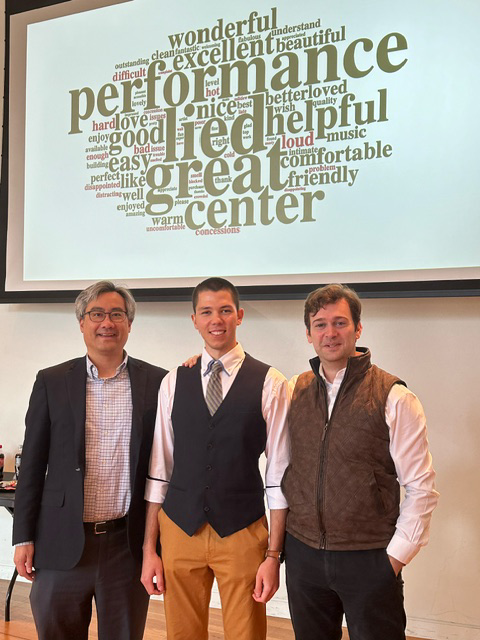Undergraduates rarely, if ever, get invited to present to a board of directors. But University of Kansas senior Nikita Kuzin did just that thanks in part to the Kansas Data Science Consortium (KDSC).
On October 11 the Friends of Lied Board of Directors invited Kuzin to present data science results from a class project he worked on last spring in a course called Community Data Labs. KDSC piloted this new course at the University of Kansas, Kansas State University, and Wichita State University to about 85 total students.
“The course is unique because all class projects use real-world datasets shared by partner organizations,” said William Duncan, assistant research professor at the University of Kansas and co-lead for the KDSC.
Kuzin’s partner was the Lied Center of Kansas, so he focused on analyzing data about Lied-sponsored performances.
“Most arts organizations and nonprofits in general do not have the bandwidth to rigorously analyze their customer relationship management databases,” said Derek Kwan, executive director of the Lied Center of Kansas.
By analyzing ticket sales data, Kuzin showed how audience members hear about performances, how they purchase tickets, and what performances they prefer.
He also looked at five years of survey responses from theatregoers. But analyzing survey comments is trickier than simply crunching numbers. Kuzin turned to a machine learning technique called sentiment analysis to analyze text data.
Trained on Amazon reviews, sentiment analysis assigns each word a numerical value from negative one to one. Words with cheery sentiments are assigned a higher value, while unpleasant sentiments get a lower value. The word excellent, for example, has a value of 0.75, while bad is valued at -0.3.
After sorting the words by their positive or negative sentiment, Kuzin displayed them as word clouds, a visualization method where font size depicts word frequency. For the survey comments, three out of four words were positive, with words like great, helpful, good, and excellent used most often.
Small businesses, townships and nonprofits rarely have the expertise to use machine learning and other advanced data analytics. The KDSC seeks to fill this need in Kansas, helping boost economic development in the state.
“Working with the KDSC has been fantastic,” said Kwan. “The insights provided by Nikita have been invaluable in helping us refine our approaches to both fundraising and attracting ticket buyers. We look forward to a continued relationship.”
The Lied Center was just one of 17 organizations that partnered with KDSC last spring. Other partners included start-up companies, banks, city governments, and environmental agencies. “We’re so fortunate to be one of those 17,” said Kwan.
Any organization in Kansas that has digital data to analyze is encouraged to reach out to KDSC.
“We are actively recruiting partner organizations and students for spring 2024,” said Duncan.
Students at K-State, KU, and WSU can enroll in the course this spring. Next year, the team will infuse its curricula into courses at smaller universities and colleges across Kansas.
An online repository of projects and teaching materials is also in the works. This repository is being designed by the consortium members and will benefit schools and organizations of all types who seek to enrich their data science programming.
“It is exciting to see the KDSC forming from a vague concept into a vibrant venture that combines academia with small businesses and non-profit organizations,” said Lior Shamir, associate professor of computer science at K-State and one of the instructors the Community Data Labs course.
Duncan co-leads the KDSC alongside colleagues from seven colleges and universities in Kansas and two other KU faculty members, Michael Branicky, professor of electrical engineering and computer science, and Jeffrey Girard, assistant professor of psychology.
The KDSC is a key educational pillar of the ARISE project, a $20 million initiative in Kansas funded by the National Science Foundation Established Program to Stimulate Competitive Research (EPSCoR) with matching funds from the Kansas Board of Regents. Through EPSCoR, NSF builds research and education capacity in traditionally underfunded states and jurisdictions — like Kansas. The ARISE team is in its second year of a five-year effort to build data science capabilities in Kansas.

University of Kansas senior Nikita Kuzin (center) poses with Derek Kwan (left), executive director of the Lied Center of Kansas, and KU Assistant Research Professor Will Duncan (right) after presenting his data science project to the Friends of Lied Board of Directors.
Filling a need
Small businesses, townships and nonprofits rarely have the expertise to use machine learning and other advanced data analytics. The KDSC seeks to fill this need in Kansas, helping boost economic development in the state.
How to learn more
Organizations may learn more about how to partner with KDSC at its website. All other inquiries, including how to add data science modules to your courses, may be directed to KDSC Program Coordinator Gryffin Eason at g.eason@ku.edu.
For information about spring course offerings, contact Dr. Shamir at K-State (lshamir@ksu.edu), Dr. Yan at WSU (fxyan@shockers.wichita.edu), and Dr. Duncan (w295d127@ku.edu) at KU. The data science website also describes KU’s curriculum.
